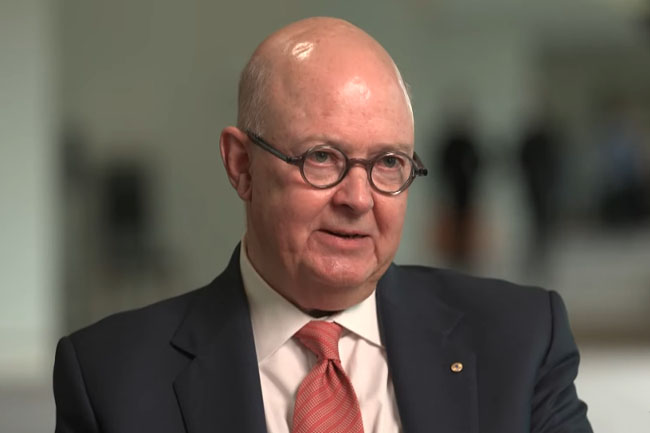The damning Murdoch tapes − hardly reported by Australia's sycophantic and scared media fraternity − have exposed Australia's American monopolist for the man he is, says former Murdoch lieutenant Rodney E. Lever.
THE MURDOCH TAPES have exposed Rupert to the world exactly as I have tried to portray the man in my various writings.
There are two sides to him: the megalomaniac-narcissist who considers himself above the law, and the nice guy who can hand out wads of shareholders money to people whose lives he has severely damaged and then bitterly complain about these same people in private afterwards.
The astonishingly candid secret recordings of Murdoch with his out on bail The Sun editorial staff clear, obtained by UK investigative website exaronews.com, is solid evidence of what I first learnt of him when I worked for Rupert in Melbourne in the 1950s and '60s — and first began to distrust him.
At first, it is hard not to like him.
Rupert is charming, friendly, considerate and well-mannered — and even generous — when he is spending his shareholders' money.
For example, I used to go to the races with him, eat lunch or dinner with Murdoch regularly. My wife and I spent time with him at his cattle property near Canberra, and he even cooked breakfast for her and took it to her on a tray on a Sunday morning, while I joined him for breakfast downstairs.
Charming.
But the real Murdoch began to emerge in various incidents.
One was when one of his long serving Adelaide employees came to me in tears one day. The man in question was a highly respected advertising manager, who had come to Melbourne from his sick bed in Adelaide to help set up an advertising sales staff for The Australian when it was established in 1964. His name was Keith Barrow. He was in his late fifties. He was a good and honourable man.
But one day Rupert found him walking very slowly up the stairs of an old office building The Australian was temporarily occupying. There was no elevator — just four flights of stairs to the top floor office. He needed to stop to rest several times before he reached the top.
Rupert bounded past him and flew up the steps to the office before Keith was even halfway. He saw Keith’s deputy and told him:
“Keith is too fucking old for this job. Sack him. You take over!”
An hour later, Keith came to see me in my office across the road. “I’ve been sacked,” he said and burst into tears.
Like most of the people who had worked for The News in Adelaide, Keith revered the Murdoch name — father and son. He had started as an office boy and, in 30 years, he had worked his way up to become a highly respected advertising manager, known and respected throughout the industry.
Now he sat before me and wept.
I gave him a cup of tea and we talked quietly. I tried to explain that Rupert was anxious about the new paper and that he would surely relent. Then I took Keith to the airport and put him on a plane.
A week later, his wife phoned me: Keith was dead from a heart attack.
*****
When Rupert was in Melbourne, he would borrow my company car to run around in. Sometimes I drove him. Sometimes he drove himself.
He had one curious habit. It showed me that he considered himself above the law. He would park the car anywhere, be it a loading zone, a no parking area or across someone else’s driveway.
When we came back to the car, there was, of course, a traffic infringement notice on the windscreen.
Rupert had a way of sweeping the ticket off the windscreen, crunching it in his hand and throwing it into the gutter. I have known many rich people, but none who would override a civilised law.
One day, after he had been using my car for a week, one of the office staff came to me to ask me politely if I realised that failure to pay a parking fine would multiply the cost several times.
Of course, I knew this.
I told the man he should send the tickets up to Sydney to be paid.
I got a phone call back to say that: When Mr Murdoch was in Melbourne we were responsible for his parking fines.
Sydney would be responsible for his fines when he was there.
These were trivial matters that I brushed aside. But they left me with a strong feeling that Rupert had not only a sad streak of raw cruelty, unworthy of a would-be magnate (in the case of Keith Barrow) and a conviction of his own invincibility and a total contempt for the law, and all those basic decencies ordinary people took for granted.
It took me twenty years to fully grasp that the man I was working for was neither generous nor decent in his various activities.
He was, I now believe, the epitome of evil.
Listening to those secret recordings, made in a meeting with a roomful of journalists − who generally are not to be trifled with even by an employer − made me realise again that he is not only evil but also rather stupid.
One of those reporters was smart enough to record the meeting. Maybe more than one.
This work is licensed under a Creative Commons Attribution-NonCommercial-NoDerivs 3.0 Australia License









